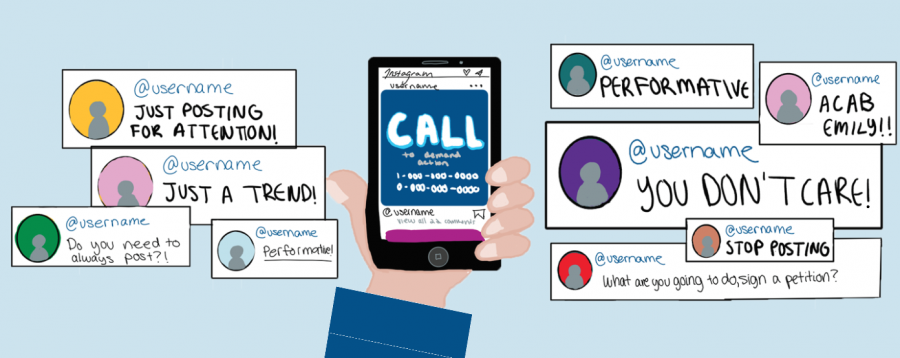Stop belittling young people’s activism
December 18, 2020
Life imitates art.
Life looks nothing like it did a year ago, and although I wouldn’t qualify Instagram as “art,” it certainly looks nothing like it did a year ago.
Just scrolling through my feed, I can see countless people posting resources about different actions one can take to support the Black Lives Matter movement or other causes they are passionate about.
A year ago, despite largely following the same people, I would not have seen any of these posts about social or political movements.
With more young adults using social media as a form of activism, the same criticism has repeatedly bubbled to the surface, as many complain that teenagers just hit “upload” and think that they’ve made a difference. I have especially seen an increase in young people criticizing posts made by their own peers.
Nobody’s activism should end on Instagram, but can we stop being overly critical of those who use it to start?
On social media platforms, stereotypes such as “ACAB Emily,” a white, female teenager who posts about incredibly progressive or radical ideas on Instagram, while refusing to challenge their own privilege in real life, have been at the end of ..countless punchlines. On TikTok, I have seen numerous jokes about the popularization of platforms such as Change.org, with one video suggesting that during the French Revolution, teens on Instagram would be asking everyone to sign a petition to get the peasants bread.
I know hundreds of people who posted a single black square and never gave police brutality a second thought.
You don’t need to look far to find someone who posted a single infographic on their Instagram story and walked away. These efforts are obviously not helpful and largely used just to be “part of a trend.”
These people who posted a singular black square and bowed out are certainly worthy of a lot of these critiques. However, it is important to realize that there are a significant number of young adults who are consistently posting, signing petitions and donating, and yet they are the ones receiving far more hate than they deserve.
A teenager posting on social media and signing a petition is not comparable to the grassroot organizers who are making the largest difference in our democracy. Change does not come from posts on someone’s Instagram story. However, the consistent belittling of young people doing what they can is counterproductive.
These measures, admittedly, are not going to make the huge difference that they are advocating for. Sixteen-year-olds are not writing legislation or drafting bills, and I think people know that. Those who post once and don’t take any other form of action are not going to make any difference, but there are a lot of other people who are genuine about their intentions.
A majority of Gen Z can’t vote. Younger teenagers can’t drive or go anywhere without a parent’s permission. So, why are young people who post about phone calls they have made or conversations they have had with their family instantly pounced on and told that they ‘don’t really care?’
For most teenagers, these calls and hard conversations with loved ones are the most impactful actions they can take.
Just sharing a post to your followers is not exactly the epitome of ground-breaking advocacy, but for young teens who lack the resources to do much else, posting on social media, signing petitions and making phone calls is the most we can ask of them. Teenagers who consistently post about a particular issue should be urged to explore it further rather than instantly be told that they are being performative.
When we discourage young people from dipping their toes in, we can never expect them to fully jump into activism.



